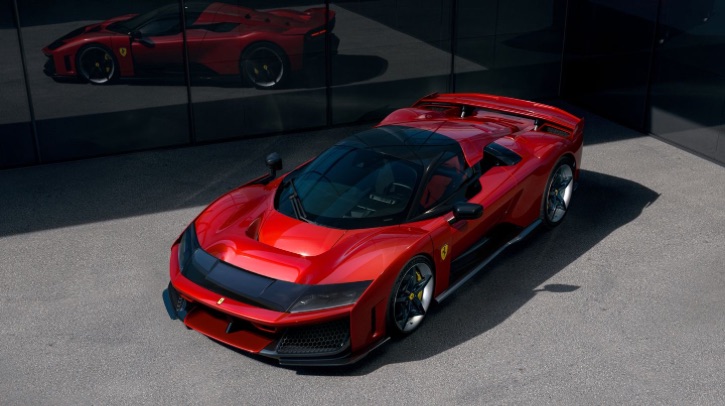Right after McLaren showcased the W1, Ferrari has answered with its latest hypercar, the F80. Limited to 799 units, it features a 3.0-liter V6 engine mated to an 800V hybrid system and three electric motors to develop 1,200hp.
The 9,200rpm 3.0-liter 120° V6 produces 900hp, making it the Ferrari engine with the highest specific power of all time. However, the engine is then accentuated by the electric front axle (e-4WD) and rear motor (MGU-K) of the hybrid system to add another 300hp. The architecture of the engine and many of its components are closely derived from the powerplant of the 499P – the race car that won the last two editions of the 24 Hours of Le Mans. An 8-speed dual-clutch F1 DCT completes the powertrain package.
The F80 is the first Ferrari road car to use an e-turbo, and it also benefits from a new approach for statistical knock control. This means the engine can operate even closer to the knock limit, allowing the use of higher combustion chamber pressures than ever. It also features an Inconel exhaust, steel crankshaft machined from a die-cast element, hot-forged crankpins with an offset angle of 120°, titanium connecting rods and aluminum pistons with high strength DLC (diamond-like carbon) coated steel for the piston pin.
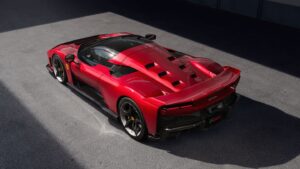
The hybrid system is derived from Ferrari’s expertise in F1 and WEC. With a high-voltage battery at 800V, the converter generates direct current at 48V to power the active suspension and e-turbo systems, and 12V direct current to power the electronic control units and all other electric ancillaries on the vehicle.
Ferrari says the F80 can develop 1000kg of downforce at 250km/h. The front end of the F80 develops 460kg of total downforce while the rear of the car generates the remaining 590kg of downforce at 250km/h. There is also an active wing that adjusts height and angle of attack continuously and dynamically.
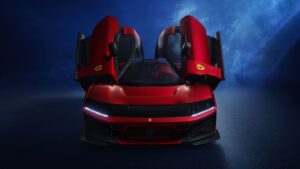
The active suspension system on the F80 features completely independent setup all round actuated by four 48V electric motors, a double wishbone layout, active inboard dampers and upper wishbones created with 3D printing and additive manufacturing technology. This solution offers optimized layout, precise wheel control, reduced unsprung mass, no requirement for an anti-roll bar and the introduction of a dedicated camber angle correction function.
This system also results in a flat ride on the track, and compliance to effectively soak up bumps in road surfaces during normal driving. There are three driving modes on offer: Hybrid, Performance and Qualify. However, there is no eDrive mode, as Ferrari says it is considered “not in keeping with the car’s mission”.
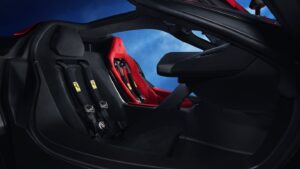
There are two tire choices – Pilot Sport Cup 2 and Pilot Sport Cup 2 R variants, both offered in sizes 285/30 R20 and 345/30 R21 (front/rear). A crucial characteristic of the F80 is its cabin. Compact proportions were made possible by opting for a cockpit inspired by a single-seat racer. Ferrari calls it a 1+ as the cockpit is centered entirely around the driver, with its forms converging toward the controls and instrument panel. There is a passenger seat, but it is integrated well and is longitudinally offset so that it sits behind and away from the action.
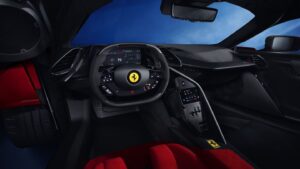
Ferrari says the F80 can reach 100km/h in just 2.15 seconds and 200km/h in 5.75 seconds. Top speed is rated at 350km/h and dry weight stands at 1,525kg. All this can be experienced for US$3.9m.


